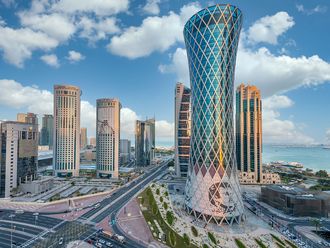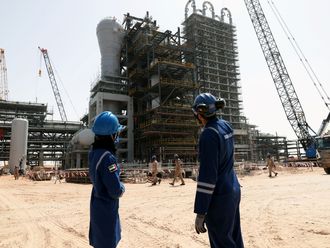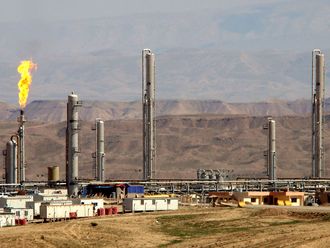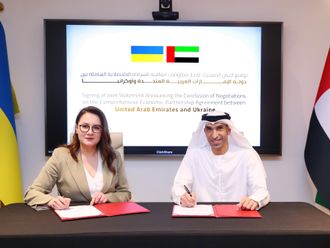London: Iran, already struggling to attract investors to its energy industry, may find things tougher still as US. President Donald Trump refuses to certify the nuclear deal that eased sanctions on Opec’s third-largest crude producer.
In a speech Friday, Trump stopped short of abandoning the nuclear agreement but said he would impose new sanctions on Iran, particularly its Revolutionary Guard Corps, a branch of the armed forces that owns many businesses including in the oil industry. The move won’t immediately curb the flow of some 2.3 million barrels of daily Iranian crude exports — more than three times the amount of oil the US has sold abroad over the past year.
For energy producers, however, the administration’s more confrontational approach does raise the risk of doing business in the Middle Eastern nation. Companies such as Total SA, which in July became the first major Western energy company to sign a production deal with Iran since the 2015 accord, may face new hurdles in contributing to the country’s estimated $100 billion (Dh367 billion) need for oil and natural gas investment.
Noting Iran “is not living up to the spirit of the deal,” Trump also warned he would terminate the agreement unless its shortcomings are addressed.
Trump’s decision was expected, but still makes “the deal shaky,” said Iman Nasseri, a senior consultant at London-based researcher FGE. Delegating further action to Congress will “keep everyone in an even more uncertain environment for longer, and also make deals with Iran even harder.”
How will Trump’s decision affect energy markets?
Trump has potentially weakened, but for the moment left largely intact the accord that world powers reached with the Arabian Gulf nation two years ago.
The White House has argued that Iran’s actions, including missile tests and support for groups like Hezbollah, violate the spirit of the deal. “It is time for the entire world to join us in demanding that Iran’s government end its pursuit of death and destruction,” Trump said in a statement issued by the White House.
The Gulf nation says its complying with the pact, which was intended to prevent it from developing nuclear weapons. Foreign Minister Javad Zarif said before Friday’s announcement that the US has “failed to implement its side of the bargain”.
The immediate effect on Iran’s crude sales may be limited. Under the last round of sanctions, the US relied on the willingness of Asian customers to buy less Iranian oil, while the European Union imposed a full embargo. Unless other parties to the deal are willing to renegotiate or scrap it — which so far they have shown little desire to do — the US under Trump is likely to be isolated this time if it targets oil sales.
“Europe seems unwilling to re-impose oil-related sanctions, as was the case in 2012,” said Homayoun Falakshahi, an analyst at consultant Wood Mackenzie Ltd. America itself hasn’t bought Iranian oil for close to 40 years, but it could seek to pressure buyers of Iranian crude, especially those with assets in the US, he said.
The Gulf country’s exports have flooded back into Asian and European markets, roughly doubling to between 2.2 million and 2.4 million barrels a day since sanctions were eased last year upon completion of the nuclear deal. Shipments to Europe surged to about half a million barrels a day after the EU lifted its embargo. Iran’s sales to China, its biggest buyer, swelled in August to the highest level since June 2016, according to ship-tracking data compiled by Bloomberg.
What’s the impact on companies investing in Iranian energy?
Trump’s decision adds to political risk of doing business in Iran, which was already higher than many other resource-rich countries. It could choke off the foreign investment Iran needs to rehabilitate ageing energy assets and boost oil and gas production.
The administration is “not particularly optimistic” about the situation and “may be out of the deal” if it can’t be fixed, US. Secretary of State Rex Tillerson told reporters on Friday.
The US has the tools to punish energy companies doing business with the Islamic republic, as many have operations in the US and use dollars to pay for equipment and contractors. “Project finance and investment will become even tougher than they are today,” said FGE’s Nasseri.
Trump’s focus on Iran’s Revolutionary Guards Corps, could become a particular problem because energy companies will probably have to do “a lot of extra due diligence before committing to any deal,” Wood Mackenzie’s Falakshahi said.
Which companies are most exposed to Iran?
International companies have been wary of signing new contracts with Iran because sanctions on financial transactions with the country remain in place. Total agreed to develop Iran’s share of the world’s biggest gasfield, the offshore South Pars deposit, in the country’s only deal with a foreign energy major since sanctions were scaled back. Paris-based Total estimates the project needs an initial $1 billion to get started.
“Total is the only company with long-term commitment and investments and interest in Iran” right now, FGE’s Nasseri said. “There will be extra risks.” Total can pay for the South Pars project with its own funds, instead of borrowing from banks, to minimise its exposure to the US financial system for Iran-related matters, Nasseri said.
Officials at Total didn’t immediately respond to a request for comment. “We are respecting international laws,” Chief Executive Officer Patrick Pouyanne said in a July interview. “If rules are changing, we will have to adapt.”
Royal Dutch Shell Plc, Italy’s Eni SpA and Russia’s Rosneft Oil Co. PJSC are among more than 30 foreign companies that have qualified for oil and gas projects in Iran since sanctions were eased. The list includes Schlumberger Ltd, an oilfield services business with principal offices in the US and Europe. American citizens can’t do business with Iran, and US companies are prohibited from working there except through foreign subsidiaries.
Wood Mackenzie’s Falakshahi expects Iranian service companies to do most of the work for the first phase of South Pars, partly due to minimum requirements for local staffing and content in the project.
What does this mean for Iran’s oil and gas production?
Iran’s gas reserves, estimated by BP Plc at 1,183 trillion cubic feet (33 trillion cubic meters), are the world’s largest and almost four times the size of US deposits. Iran has raised oil output by about a third to some 3.8 million barrels a day since sanctions were eased in January 2016, and it’s seeking to boost production capacity for crude to 4.7 million barrels a day over the next five years.
Trump’s position may “curb the enthusiasm of European and some Asian corporates for following through with plans to invest in the Iranian upstream sector,” said Helima Croft, global head of commodity strategy at RBC Capital Markets LLC in a note published before Trump’s announcement. This, in turn, could “force foreign refineries to source less crude from Iran, especially if the threat of being locked out of US capital markets was revived”.












